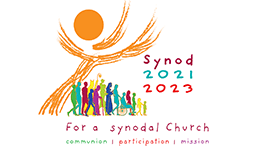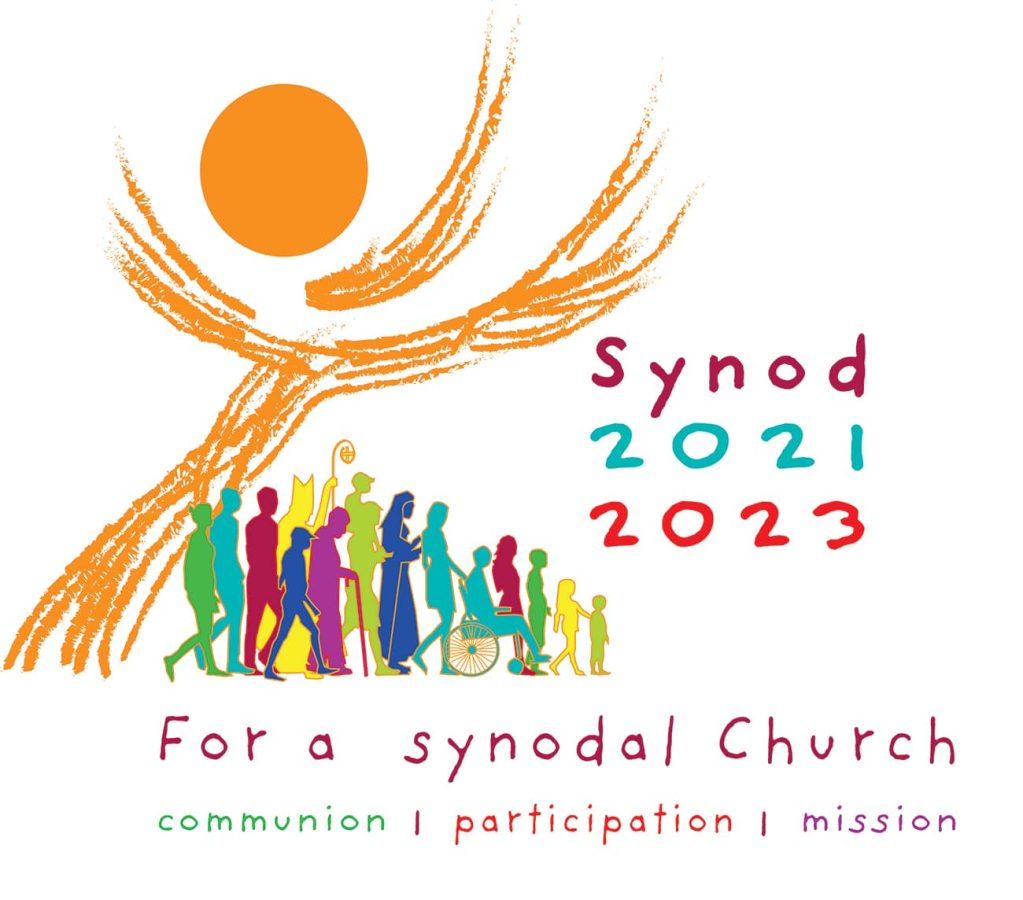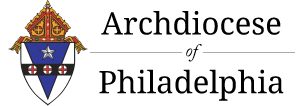
The “Synod on Synodality: Communion, Participation, and Mission”
is a two-year process of listening and dialogue beginning in 2021 and concluding in 2023.
Pope Francis invites the entire Church to reflect on a theme that is decisive for its life and mission: “It is precisely this path of synodality which God expects of the Church of the third millennium.” This journey, which follows in the wake of the Church’s “renewal” proposed by the Second Vatican Council, is both a gift and a task: by journeying together and reflecting together on the journey that has been made, the Church will be able to learn through her experience which processes can help her to live communion, to achieve participation, to open herself to mission. (Courtesy of USCCB).
SYNOD REPORTS
Archdiocese of Philadelphia Synod Report
North American Final Document for the Continental Stage of the 2021-2024 Synod (English • Spanish)
Information for Pastors, Community Leaders and Facilitators
In order to offer as many of the faithful as possible with multiple opportunities to participate and be heard, synodal consultations were held archdiocesan-wide through both in-person regional meetings and virtual meetings utilizing Zoom. In both cases, the meetings were facilitated by Catholic Leadership Institute and lasted approximately 2 hours, including breakout sessions for participants.
Additionally, there were local synodal meetings. Each parish was encouraged to hold local meetings best suited to that community. Institutions and communities sponsored and supported by the Archdiocese were also encouraged to offer the opportunity of synodal consultations for their members. To assist parishes, Archdiocesan institutions and communities in holding these local consultations, trained for synod facilitators. This training provided facilitators with the information and materials needed to conduct locally what took place at the Archdiocesan-wide in-person and virtual regional listening sessions.
Virtual meetings were recorded and available for viewing by those unable to attend a scheduled session.
Facilitator Resources
Adaptive Facilitator Resources
Synod Timeline
Local Facilitators Training (February – March)
February 15th – March 1st (for the training of Archdiocesan parish, institution and community facilitators)
Archdiocesan-wide Listening Sessions (March – April)
In-person Meetings: March 19th/20th & April 2nd/3rd
(facilitated by Catholic Leadership Institute)
Virtual Sessions: March 19th through April 9th
(facilitated by Catholic Leadership Institute)
Local Sessions (March – May)
Archdiocesan Sponsored Sessions for specific groups and communities
(facilitated by Catholic Leadership Institute)
Parish Sponsored Sessions
(facilitated by Catholic Leadership Institute)
Non-Formal Opportunities for Consultation (March – May)
Opportunity for anyone to contribute to the Archdiocesan consultation
individually via the Archdiocesan Synod webpage, through means of an electronic submission.
Submission of feedback from all Synodal Consultations (through May)
Module will be provided for local consultations to submit feedback from meetings.
Archdiocesan Pre-Synodal Meeting with Liturgical Celebration (early to mid-June)
Conclusion of the Archdiocesan Synodal Consultation
Submission of Archdiocesan Synodal Report (by June 30th)
Synod Resources
To learn more about the synod in the Archdiocese of Philadelphia, please send inquiries to [email protected].
Archdiocese of Philadelphia Synod on Synodality Synthesis of the Diocesan Phase
Archdiocese of Philadelphia Synod on Synodality Summary
Preparatory Document from the Vatican
Official Handbook for Listening and Discernment in Local Churches (Vademecum)

Prayer for Synod on Synodality
We stand before You, Holy Spirit,
as we gather together in Your name.
With You alone to guide us,
make Yourself at home in our hearts;
Teach us the way we must go
and how we are to pursue it.
We are weak and sinful;
do not let us promote disorder.
Do not let ignorance
lead us down the wrong path
nor partiality influence our actions.
Let us find in You our unity
so that we may journey together
to eternal life and not stray
from the way of truth and what is right.
All this we ask of You, who are at work in every place and time, in the communion of the Father and the Son, forever and ever.
Amen.
Adsumus Sancte Spiritus
Nos encontramos ante ti, Espíritu Santo,
al reunirnos como familia en tu nombre.
Solo tú eres nuestro guía,
haz de nuestros corazones tu hogar.
Enséñanos el camino que debemos seguir
y la manera en que debemos recorrerlo.
Somos débiles y pecadores;
no nos dejes impulsar el desorden.
No dejes que la ignorancia nos lleve por el camino equivocado,
ni la preferencia influya en nuestras acciones.
Permite que encontremos en ti nuestra unidad,
para que caminemos juntos hacia la vida eterna
y no nos desviemos del camino de la verdad
y de lo que es lo correcto.
Te pedimos todo esto a ti,
que estás presente en todo lugar y en todo tiempo,
en comunión con el Padre y el Hijo,
por los siglos de los siglos.
Amén
Synod of Synodality FAQs
What is a synod?
A synod is a council of the Church, usually convened to decide an issue of doctrine, administration or application. The word synod is from the Greek sinodos meaning “assembly” or “meeting” and is similar to the Latin concilium meaning “council”. Sometimes the phrase “general synod” or “general council” refers to an ecumenical council, like the Second Vatican Council (1962-1965).
What is a Synod of Bishops and why do they happen?
At the end of the Second Vatican Council, Saint Pope Paul VI sensed the need for the Roman Pontiff to continue meeting periodically with the bishops of the world, which is why, on September 15, 1965, he established a new entity within the Church called the Synod of Bishops. The Synod of Bishops is a permanent institution that forms part of the Church’s long tradition of organizing ecclesial assemblies to deliberate on the most pressing issues of a particular place and time. Since its establishment in 1965, the Popes have called for and led a total of 15 General Ordinary Assemblies, 3 General Extraordinary Assemblies, and 11 Special Assemblies of the Synod of Bishops. The topics of each assembly are selected by the Pope. The most recent General Assemblies have been on Youth, Family, New Evangelization, the Word of God, and the Eucharist.
What is Synodality?
In the words of Pope Francis, a synodal Church is a “listening Church knowing that listening is more than feeling. It is a mutual listening in which everyone has something to learn. We must all listen to the Holy Spirit, the spirit of Truth to know what the Spirit is saying to the Church. […] This is what the Lord expects from the Church of the third millennium.” (Address at the commemoration of the 50th anniversary of the Synod of Bishops, 17 October 2015). Synodality provides opportunities to listen to the Holy Spirit and the People of God in order to discern together and walk forward on a common path, accompanying each other on the spiritual journey as we live out our missionary call to personal discipleship with our Lord.
What is the current Synod?
In the ceremony to commemorate the 50th anniversary of the institution of the Synod of Bishops in October 2015, Pope Francis declared that “the world in which we live, and which we are called to love and serve, even with its contradictions, demands that the Church strengthen cooperation in all areas of her mission.” (For a Synodal Church handbook) This call to cooperate in the mission of the Church is addressed to the entire People of God. In April 2021, Pope Francis initiated a synodal journey of the whole People of God, to begin in October 2021 in each local Church and culminating in October 2023 in the Assembly of the Synod of Bishops.
What is the goal of this Synod?
The objective of this Synodal Process is not to provide a temporary or one-time experience of synodality, but rather to provide an opportunity for the entire People of God to discern together how to move forward on the path towards being a more synodal Church in the long-term. Pope Francis characterizes the two interrelated goals of this process of listening: “to listen to God, so that with him we may hear the cry of his people; to listen to his people until we are in harmony with the will to which God calls us.”
Why are we participating in a Synod at this time?
In October 2015, Pope Francis stated that “the world in which we live, and which we are called to love and serve, even with its contradictions, demands that the Church strengthens cooperation in all areas of her mission.” This process is especially important during times of changes in Church and society. We must reflect on the signs of the times in light of the Gospel.
“The decision to ‘journey together’ is a prophetic sign for the human family, which needs a shared project capable of pursuing the good of all… We need to let ourselves be educated by the Spirit to a truly synodal mentality, entering with courage and freedom of heart into a conversion process that is indispensable for the ‘continual reformation of which [the Church] always has need, in so far as she is a human institution’” (Synod 2023 Preparatory Document, no. 9).
Who can participate?
All the baptized are invited to participate in this Synodal Process. Special care should be taken to involve those persons who may be at risk of being excluded: persons with disabilities, migrants, refugees, the elderly, people who live in poverty, inactive Catholics, etc.
What is the role of the Archdiocese?
Each diocese will carry out the Synodal Process in a way that best responds to their local circumstances. In the Archdiocese of Philadelphia, we are working with Catholic Leadership Institute to implement the Disciple Maker Index (DMI) survey at every parish in the Archdiocese from March 2 to April 4. The DMI survey is a nationally recognized survey administered at parishes around the United States and Canada since 2013 by The Catholic Leadership Institute. The results from this survey will provide baseline feedback that will be added to the feedback received through the engagement sessions in March and April. Maximum participation will be encouraged through all Archdiocesan structures and communication channels to involve the greatest number of people as possible.
What will be the outcome of this Synodal process?
Because the history of the Church gives ample witness to the importance of consultation of diocesan clergy and faithful in matters pertaining to the good of the Church, these discussions are given special attention. The consultations are followed by discernment on the part of bishops chosen for the task, united in the search for a consensus that does not spring from worldly logic, but from common obedience to the Spirit of Christ. Attentive to the sense of the faith of the people of God – which they need to carefully distinguish from changing public opinion – the Synod Bishops will then work together for ecclesial consensus, which is not determined by the tallying of votes, but is the outcome of the working of the Holy Spirit which enlivens the one Church of Christ.
Pope Francis has affirmed that this Synod of Bishops must increasingly become an instrument for listening to the People of God. The results are then submitted to the Holy Father in his capacity as universal Pastor of the Church. Once the results have been accepted by the Holy Father, an implementation phase in every diocese follows, to initiate the reception of the Synod’s conclusions. It must be remembered that given the diversity throughout the world, the results must be enculturated if they are to be respected and applied.
In this way, it can be seen that the synodal process not only has its point of departure, but also its point of arrival in the People of God, upon whom the gifts of grace bestowed by the Holy Spirit through the Synod of Bishops must be poured out.
Read more about the Synod
- Archbishop Nelson J. Perez will be principal celebrant and homilist for the closing Mass of the archdiocesan phase of the Synod on Synodality, in the chapel of the Cathedral Basilica of SS. Peter and Paul. The post Local closing Mass of synod set for June 4 appeared first on CatholicPhilly.
- Local Catholic college students participating in campus listening sessions found their concerns were heard not only by the church, but also by peers "who experienced similar struggles." The post Students share joys, concerns about church at synod sessions appeared first on CatholicPhilly.
- In the church's current synodal process and the coming eucharistic revival in the U.S., Archbishop Jose Gomez of Los Angeles sees a confluence of paths on our earthly journey with the Lord. The post Life of conversion begins with baptism, peaks with Eucharist appeared first on CatholicPhilly.
- Meeting with the heads of women's religious orders in Rome, Pope Francis used in a wheelchair for the first time publicly, due to his ailing knee. He called for authority "that does not leave wounds along the way, but growth." The post From wheelchair, pope tells nuns ‘I count on you’ for synod listening appeared […]
- The synodal process of listening to the Holy Spirit and to one another is drawing hundreds of students and faculty to share their experiences of the church at local Catholic campuses and Newman centers. The post On 14 college campuses, young adults are heard via synod appeared first on CatholicPhilly.
- The Chadds Ford, Delaware County parishioners are looking to be "refreshed and renewed in the faith” through the synod's process of encounter and dialogue, which requires honest engagement by lay people and clergy. The post St. Cornelius Parish ready for synod to breathe new life in church appeared first on CatholicPhilly.
- A Georgetown discussion explored Pope Francis' vision for the synod underway in the Catholic Church that, although "beset by problems," is "embarking on something new" that calls everyone to live the "mission of loving God and our neighbors." The post Listening is an important part of pope’s ministry, panel says appeared first on CatholicPhilly.
- As part of the church's Synod on Synodality, 18 local gatherings will take place March 19-20 and April 2-3 at designated parishes in the region, plus 10 virtual sessions, all designed to enable the people of God to walk together. The post Schedule set for synod listening sessions in archdiocese appeared first on CatholicPhilly.
- In-person and online gatherings have been scheduled as part of the universal Synod on Synodality, with a goal of creating a church that "journeys together" more deeply and that hears from "God's people at all levels." The post Archdiocese announces listening sessions for synod appeared first on CatholicPhilly.
- A comment that "synodality starts with coffee" led a planner with the Diocese of Davenport, Iowa to brew a down-home way to invite people to a synod discussion. The post Diocese’s ‘58,000 Cups of Coffee’ initiative fuels synod conversations appeared first on CatholicPhilly.
Visit the Archdiocese of Philadelphia Facebook page and Archbishop Pérez’s Facebook page for latest updates and information.





